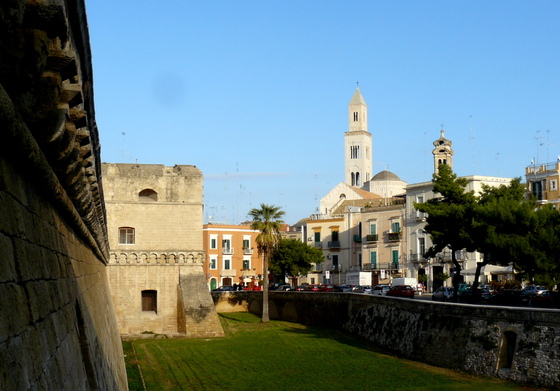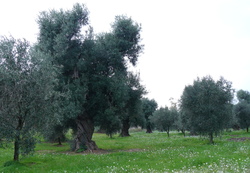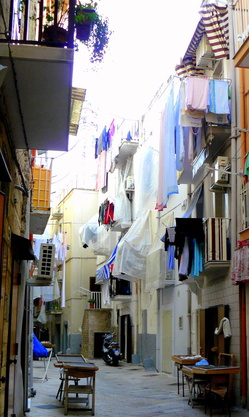 |
| Bari's 12 C castello, built by Frederick II, and its 15th C Romanesque cathedral |
BARI, Italy--We are back in Puglia ("Apulia" in English), last visited three years ago on a wine tour, this time around for a symposium sponsored by the Italian Travel Promotion Council and ENIT (Italy's National Tourist Board). Over 200 American travel agents, two dozen tour operators and about 20 journalists from the USA are participatiing.
It's too soon to tell what priority tourism will have in the "austerity budget" to be presented later this month by the new government of Prime Minister Mario Monti (just sworn in yesterday), although the signs point distressingly toward reduction to zero. Yes, Italians have the understandable notion that the whole world already knows about its historic cultural treasures, ideal climate, great food and pleasurable lifestyle. In this they are not alone; it is a homegrown pride that is (quite often) justifiable, yet quaint and ultimately short-sighted. But tourism promotion is not a luxury.
When Washington State eliminated tourism promotion from its budget, the only audible protest came from Seattle hotelkeepers who knew that people have to be encouraged to travel to specific places. You must tell your story over and over, the marketing folks lecture you; the public is a passing parade, not a static classroom of docile fourth-graders. Tourism professionals like travel agents need constant reminders, too, ideallly in the form of field trips, to experience the uniqueness of the "product," of the destination.
And the destination here in Puglia, the heel of the Italian boot, is certainly attractive. Some 500 miles of pristine coastlne dotted with ancient watchtowers (to guard against invaders); historic architecture (Roman, Greek, Norman, Byzantine); modern cities like Bari, Baroque cities like Lecce, prehistoric settlements like Alberobello, limestone hilltowns like Ostuni; medieval strongholds like Castel del Monte; vast groves of olive trees, and vineyards planted with southern Italy's best full-bodied reds (Negroamaro, Primitivo and Nero di Troia).
 |
| Olive grove in Puglia |
Don't get me wrong, it's a stunning region, even without the beaches, but there's a campanilismo here, a short-sighted, provincial, shoulder-shrugging attitude, that seems to undervalue the surprisingly broad cultural heritage.
Welcoming the delegates, Mauro Galli, the ITPC president, pointed out that Puglia is at least 30 percent less expensive than the rest of Italy, especially compared to the strasopheric prices of hotels in Venice or Florence. Whether the price advantage alone will draw American travelers is far from clear.
 |
| Street scene in Old Bari |
Puglia's capital, Bari, is a vibrant, modern Italian city, as big as Portland, Ore., with a pedestrians-only old town (narrow streets with washing hanging from the balconies), a busy harbor (shipping to Mediterranean ports, cruise ships, car ferries across the Adriatic) and imposing Mussolini-era buildings along the waterfront. The palazzo housing its Chamber of Commerce may not have wi-fi (for shame, for shame), but the city does have a dozen shared-bicycle stations and a stunning Romanesque basilica. And Puglia boasts a coastline that's every bit as long and varied as Florida's. It's embarrassing, frankly, that Americans haven't discovered this wonderful land.
So much for the first day; there's more to come. More seminars and site visits, more pictures, too.
No comments:
Post a Comment